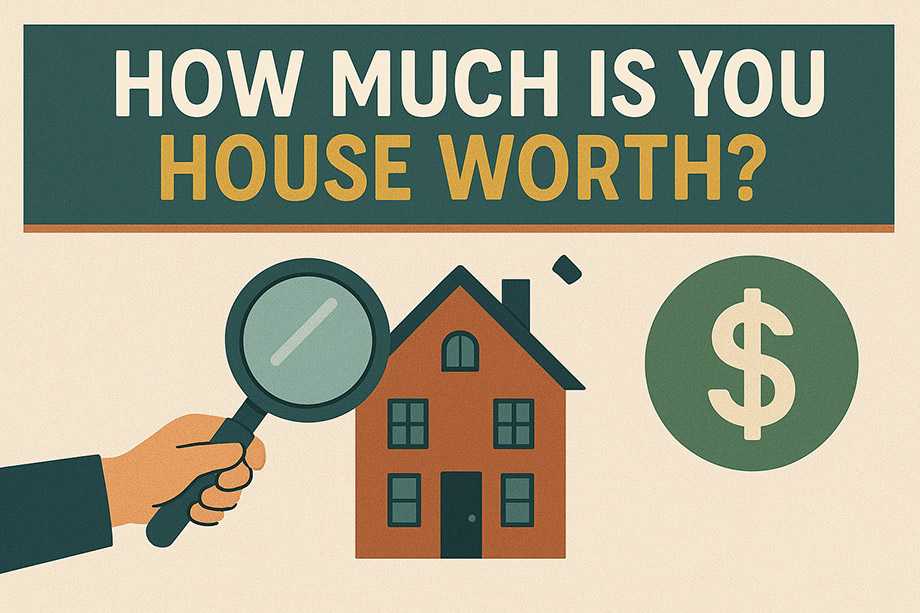How Much Is Your House Worth? The Complete UK Property Valuation Guide for 2025

Understanding your property’s current market value is crucial whether you’re planning to sell, remortgage, or simply curious about your biggest asset. In today’s dynamic UK property market, knowing exactly how much your house is worth can help you make informed financial decisions and plan for the future.
Why Knowing Your Property Value Matters
Your home’s value affects more than just potential selling price. It influences your borrowing capacity, insurance premiums, and overall financial planning. With UK house prices experiencing significant fluctuations, staying informed about your property’s worth has never been more important.
Recent market data shows that property values can vary dramatically even within the same postcode, making accurate valuation essential for any homeowner considering their next move.
Quick Ways to Value Your House Online
Instant Online Valuations
The fastest way to get a property estimate is through online valuation tools. These automated systems use public data from HM Land Registry, recent sales information, and sophisticated algorithms to provide immediate estimates.
Key benefits of online valuations:
- Available 24/7 from your own home
- Completely free with no obligation
- Instant results within seconds
- Regular updates as market conditions change
What Online Tools Consider
Online valuation platforms analyse several data points including recent comparable sales in your area, property size, type, and age. They also factor in local market trends and regional price movements to generate their estimates.
However, these tools have limitations. They cannot assess your property’s unique features, recent renovations, or current condition – all factors that significantly impact actual market value.
Factors That Influence Your Property’s Value
Location and Local Amenities
Your postcode remains the biggest factor in determining property value. Proximity to good schools, transport links, shopping centres, and green spaces can add thousands to your home’s worth.
Properties in areas with planned infrastructure improvements often see value increases, while those in declining areas may experience the opposite effect.
Property Characteristics
Size and Layout: Larger properties with flexible living spaces typically command higher prices. Open-plan layouts, additional bedrooms, and extended living areas all add value.
Age and Style: Period properties with original features can attract premium prices, while modern homes appeal to buyers seeking contemporary living. The key is matching your property type to current market demand.
Condition and Maintenance: A well-maintained property will always outperform one requiring significant work. Regular upkeep and timely repairs protect and enhance your investment.
Recent Improvements and Renovations
Smart home improvements can significantly boost property value. Kitchen and bathroom upgrades typically offer the best return on investment, while extensions and loft conversions can add substantial value if done well.
Energy efficiency improvements have become increasingly important, with eco-friendly features now commanding premium prices as buyers become more environmentally conscious.
Professional Valuation vs Online Estimates
When to Use Professional Valuations
While online tools provide helpful estimates, professional valuations are essential for:
- Mortgage applications and remortgaging
- Insurance purposes
- Tax assessments
- Legal proceedings or divorce settlements
- Accurate pricing before selling
What Estate Agents Consider
Professional estate agents bring local market knowledge that online tools cannot match. They understand buyer preferences in your area, current demand levels, and how properties similar to yours are performing in the market.
A good estate agent will also provide realistic timescales for selling and suggest improvements that could boost your property’s appeal to potential buyers.
Understanding Market Trends and Timing
Current UK Property Market Conditions
The UK property market in 2025 continues to show regional variations, with some areas experiencing growth while others see price adjustments. Understanding these broader trends helps contextualize your property’s value.
Interest rates, employment levels, and government housing policies all influence property values. Staying informed about these factors helps you understand whether your home’s value is likely to rise or fall in the coming months.
Best Times to Value Your Property
Consider getting your property valued:
- Before major life changes like retirement or job relocation
- When interest rates change significantly
- After completing major renovations
- Annually for financial planning purposes
- When comparable properties in your area sell
Maximizing Your Property’s Value
Cost-Effective Improvements
Not all improvements add value. Focus on updates that appeal to the broadest range of buyers:
- Fresh paint in neutral colors
- Updated flooring throughout
- Modern kitchen appliances
- Improved lighting and electrical systems
- Enhanced curb appeal through landscaping
Avoiding Over-Investment
Be cautious about improvements that exceed your local market’s expectations. A luxury kitchen in a modest neighborhood may not recover its cost, while basic upgrades in a premium area might be insufficient.
Research what buyers in your price range expect and invest accordingly.
Getting the Most Accurate Valuation
Multiple Opinion Approach
For the most accurate picture of your property’s worth, consider:
- Three online valuations from different platforms
- Two professional estate agent valuations
- A formal surveyor’s valuation if needed for legal purposes
This multi-source approach helps identify any significant discrepancies and provides a more reliable value range.
Preparing for Professional Valuations
When arranging professional valuations:
- Ensure your property is clean and well-presented
- Compile a list of recent improvements and their costs
- Gather information about local sales and market conditions
- Be realistic about your property’s condition and any issues
Common Valuation Mistakes to Avoid
Emotional Attachment
Many homeowners overvalue their properties due to emotional attachment. Try to view your home objectively, considering what a stranger would pay for it in the current market.
Ignoring Market Conditions
Your property’s value in 2020 may bear little resemblance to its current worth. Market conditions change, and your valuation should reflect current reality, not past performance.
Focusing Only on Asking Prices
Properties’ asking prices don’t reflect their actual value – only sold prices matter. Research recently completed sales in your area for accurate market insight.
Planning Your Next Steps
If You’re Considering Selling
Armed with accurate valuation information, you can make informed decisions about timing, pricing, and marketing strategies. Consider whether current market conditions favor sellers or if waiting might be beneficial.
If You’re Not Selling
Understanding your property’s value helps with financial planning, insurance coverage, and investment decisions. Regular valuations ensure you’re not caught off-guard by market changes.
Conclusion
Knowing how much your house is worth provides valuable insight into your financial position and future options. While online tools offer convenient starting points, professional valuations remain essential for important decisions.
The key is understanding that property value is not static – it changes with market conditions, improvements, and local developments. Regular monitoring helps you stay informed and make better decisions about your most valuable asset.
Whether you’re planning to sell, remortgage, or simply staying informed, accurate property valuation is a crucial tool for successful homeownership in today’s UK market.
For the most current property valuations and market insights, consult with local estate agents who understand your specific area’s unique characteristics and buyer preferences.
Last Updated on July 23, 2025 by James Cartwright







